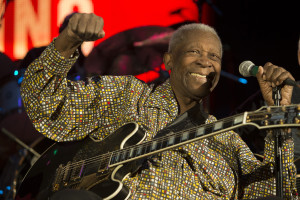Distinguished Artist Recipient, 2015 Governor’s Arts Awards
 As he approaches his ninth decade, B.B. King continues to reign as the unchallenged “King of the Blues.” Named one of the top ten guitarists of all time by Rolling Stone magazine, King’s legacy and influence far exceeds the blues and qualifies him as one of a handful of the most influential American musicians of the past century. A household name around the world, he is a cultural icon and the epitome of a distinguished artist. Over the past seventy years, he has released over fifty albums and received fifteen Grammy awards; had a museum named in his honor, the B.B. King Museum and Delta Interpretive Center; and become the brand name for music clubs in Memphis, Nashville, and Orlando. King is a living musical giant whose contribution to arts and culture in Tennessee cannot be overstated.
As he approaches his ninth decade, B.B. King continues to reign as the unchallenged “King of the Blues.” Named one of the top ten guitarists of all time by Rolling Stone magazine, King’s legacy and influence far exceeds the blues and qualifies him as one of a handful of the most influential American musicians of the past century. A household name around the world, he is a cultural icon and the epitome of a distinguished artist. Over the past seventy years, he has released over fifty albums and received fifteen Grammy awards; had a museum named in his honor, the B.B. King Museum and Delta Interpretive Center; and become the brand name for music clubs in Memphis, Nashville, and Orlando. King is a living musical giant whose contribution to arts and culture in Tennessee cannot be overstated.
Born Riley B. King in 1925 on a rural Mississippi plantation, he has been immersed in Southern music traditions since childhood. After an early start playing on small town street corners, King hitchhiked to Memphis in 1947. Settled there with his cousin Bukka White, he got his first break performing on Sonny Boy Williamson’s KWEM radio program. By 1948 he had earned his own show, “Sepia Swing Club,” on legendary station WDIA, and had become a regular performer at the Sixteenth Avenue Grill.
At one of King’s more memorable shows from the mid-1950s, a wild bar fight broke out between two men over a woman named Lucille. The ruckus eventually caused a fire and the evacuation of the building. King, having at first left his guitar behind, was forced to risk his life to reenter and save his beloved instrument. Since that night he has called each of his guitars Lucille. The name has been a reminder never to do something as foolish again, and today remains an iconic moniker for each of his trademark Gibson guitars.
King scored his first hit, “Three O’ Clock Blues,” in 1952. In the years that followed, he amassed a series of chart-topping songs, including classics such as “Payin’ The Cost to the Boss,” “How Blue Can You Get,” “Everyday I Have the Blues,” “Why I Sing the Blues” and “The Thrill is Gone”—a pop crossover which won a 1970 Grammy Award and entered the Grammy Hall of Fame in 1998. He toured extensively as a young performer, and in 1956 performed an astounding 342 shows. Even in recent decades, he has averaged over 250 concerts per year.
B.B. King elevated the status of blues music and has influenced generations of musicians. His signature single string guitar style—marked with clear, distinct noting in the right hand and emotive vibrato in the left—has been imitated by players such as Eric Clapton, George Harrison, and Jeff Beck. In 2009, Time called him one of the top ten electric guitar players of all time.
He is an inductee in the Blues Foundation Hall of Fame and The Rock and Roll Hall of Fame; a recipient of the Presidential Medal of Freedom, National Academy of Recording Arts and Sciences Lifetime Achievement Grammy Award and the Kennedy Center Honors; and a conferee of several honorary doctorates from distinguished colleges and universities. His name is synonymous with Memphis and Beale Street, and he is a proud ambassador of the blues. Today, B.B. King’s music continues to inspire and entertain around the world.

